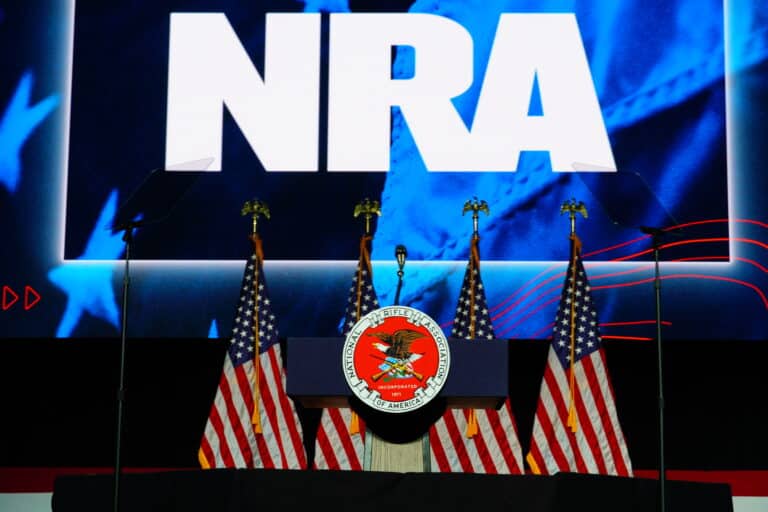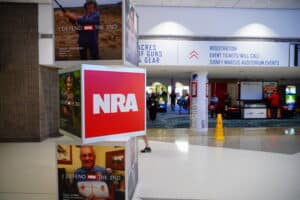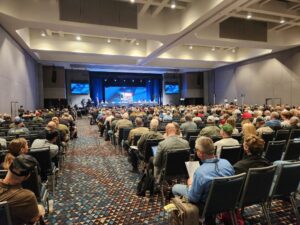Manhattan, New York — The National Rifle Association will not have to contend with a court-appointed overseer as it moves forward under new leadership, a New York judge ruled on Monday.
Judge Joel Cohen rejected New York Attorney General Letitia James’s (D.) request to subject the group to a monitor after a jury found in February that it failed to safeguard its charitable asserts or protect whistleblowers. Cohen did bar former CEO and Executive Vice President (EVP) Wayne LaPierre, who resigned for health reasons shortly before the jury found him liable for millions in damages to the NRA, from rejoining the group in an official capacity for ten years–though James wanted him barred for life. However, he found no further relief was necessary for NRA Secretary John Frazer’s role in filing false statements on behalf of the group.
Cohen’s ruling emphasized the same First Amendment concerns trumpeted by the NRA, which were similar to those in the group’s recent unanimous Supreme Court victory against a different New York official. He said a government-appointed monitor would be “potentially speech chilling” and agreed with the NRA that it raised “legitimate concerns” about the group’s First Amendment rights. But he also cited the group’s internal reforms and democratic governance mechanisms as further reasons to avoid the “last resort” option of a monitor.
The NRA has been dogged by corruption allegations and the New York case for over a half-decade, with membership and revenue sliding the entire time. That has left the gun-rights behemoth at a financial and political nadir. The ruling and subsequent end of the case could help the group refocus on rebuilding its strength.
Judge Cohen made a point to express his confidence in “serious” reformers. He pointed to NRA First Vice President Bill Bachenberg, Second Vice President Mike Vaughan, and CEO Doug Hamlin, along with compliance personnel Robert Mensinger and Medrano. He commended Sonya Rowling, the NRA’s current Treasurer and a former whistleblower, for exhibiting the “spine to stand up to power” in and since 2018.
The judge said he was also reassured by “members and donors” expressing their active interest in the future of the NRA. “The environment around the NRA has changed,” he said.
However, Cohen prefaced his ruling with some harsh words that excoriated unduly rosy press releases and public comments by NRA leaders in the wake of the jury verdict. The judge also warned that “in the event of future wrongdoing,” which would “likely come back to this court,” the NRA would be viewed in less favorable a light. He predicted “grim results” for anyone involved in potential future problems.
He also recommended the group adopt a series of changes that he believed would be more appropriate remedies than what the AG wanted. He proposed turning “some or all” of the reforms suggested by the NRA’s Audit Committee on the eve of trial into a court order. He said the group’s current rules “erect barriers to getting on the ballot” for board elections and suggested “expand[ing] the path” in order to avoid “unhealthy entrenchment.” Cohen suggested the NRA hire an in-house consultant to “recommend best practices,” but said they wouldn’t be required to report to the AG or him. He also recommended a new rule that would exclude people who were on the Audit Committee during the period covered by the jury’s ruling from serving on the committee now, at the very least not as chair or vice chair. He also said the NRA should reduce the size of its board because while a large board “makes sense for fundraising,” it can be “unmanageable.”
He ordered the NRA and the AG’s office to work through the list of suggestions next week to see which they might agree on.
The NRA applauded Judge Cohen’s decision. “Freedom prevails, again,” NRA President Bob Barr said in a statement where he promised the group would “continue to pursue improvements to our commitment to good governance.” NRA counsel William Brewer credited the ruling to the group’s ongoing reform efforts and concerns it highlighted about the constitutionally questionable proposal to have a government-appointed official oversee its operations.
“Today’s developments validate the NRA’s reform efforts and commitment to good governance – and recognize the First Amendment stakes of this case,” he said in a statement. “Based on the record established at trial, the court rejected the NYAG’s request for a monitor.”
AG James rejected the idea the ruling was a loss for her office despite the judge denying her preferred outcome as potentially unconstitutional. She pointed to Judge Cohen’s request the two sides propose a series of reforms the NRA could undertake without the supervision of a monitor as evidence there was still work to be done inside the group.
“The judge called for reforms to the NRA’s governance and internal policies, and we will submit proposals for those reforms, including enhanced compliance efforts,” she wrote on social media. “Once again, we are holding the NRA accountable for this rampant corruption and self-dealing. No one, including the NRA and Wayne LaPierre, is above the law.”
The NRA has long contended James’s prosecution was politically motivated based on her public comments and association with the group’s political opponents. In 2018, the Attorney General campaigned on the promise that she would “target the NRA,” which she also labeled a “terrorist organization.” Governor Cuomo directed the state’s financial regulator to take action against the NRA, which resulted in the Supreme Court unanimously siding with the gun-rights group earlier this year.
Both the New York Attorney General’s lawsuit and the Governor’s pursuit of NRA vendors were preceded by private communications with Everytown for Gun Safety, who described its strategy influencing regulators and took credit for driving government action against the NRA in a press call. However, Cohen previously rejected First Amendment retaliation claims made by the NRA over that coordination because he found media reports of financial mismanagement gave the Attorney General independent probable cause. Although, The Trace, a media outlet that has taken credit for its early stories on the corruption allegations leading to James’s lawsuit, receives funding from and was described as “one of the most consequential ideas we ever had at Everytown” by one of the group’s former executives.
Mike Spies, who broke several of those early stories for The Trace, emphasized his reporting was not influenced by Everytown or any of the publication’s other funders.
“Before we published the first self-dealing story, I worked in total secrecy,” Spies told The Reload. “Only my editors knew about the material I had gathered. Though Everytown later championed the work, it had absolutely nothing to do with it, and knew nothing about it. This holds true for all of my and my colleagues’ work. The Trace’s editorial operation works completely independent of its funders, and always will.”
LaPierre argued in court on Monday that if the state received its intended remedies, “James will have, in effect, fulfilled her campaign promise.”
In her closing, NRA lawyer Sarah Rogers argued the case resulted in “gossip and antagonism” at the NRA that was “stoked by its regulator.” She argued the Attorney General’s office actively involved itself in board affairs amidst litigation, privately texting directors that other board members were part of a “cabal,” actively asking for updates on elections, and offering private opinions on results. She also emphasized the effect that the AG’s six-year-long effort had on the NRA’s operations. She said the case was “chilling and complicating” hiring and communications, putting staff under constant fear that anything said or done “could be subpoenaed.”
Judge Cohen agreed that New York’s efforts did negatively impact the NRA. Rogers recognized the NRA’s struggles in her closing but offered an optimistic view of its future.
“The NRA is a democracy,” she said in her closing. “Like American democracy, it sometimes errs. It contains imperfections, factions, century-old habits, and traditions. The NRA has done more- for its members, mission, stakeholders, its governance, its controls, its future – than any lawyer could cover in an hour. It can do more, and it will, on its own. But, your honor, when it comes to the NRA, the state of New York has done enough.”
Ultimately, Judge Cohen recognized the “hostile political environment” faced by the NRA, both “then and now.” He found the AG’s request for a court-appointed monitor was too “heavy-handed” to make sense.
Doug Hamlin, the NRA’s new CEO and EVP, called Cohen’s decision a “major step toward rebuilding the trust of the members, donors, industry, and our staff.”
“The NRA is moving forward full speed ahead,” Hamlin said. “We have a mission to fulfill and elections to win up and down the ballot.”
UPDATE 8-02-2024 2:09 PM EASTERN: This piece has been updated with more details from Judge Cohen’s ruling as well as comments from the NRA, Letitia James, and Mike Spies.







One Response
As an Endowment Life Member who has used his donations for the SAF, GOA & FPC for at least five years, my dollars will not return while the SLC exist, Brewer is involved and the old guard of Barr, Cotten, et al involved my dollars remain otherwise. Just not a good risk.